The Maple Leafs fell 4-2 to the Canadiens on Saturday night despite handily outshooting their opposition, as occasional defensive lapses and a horrendous refereeing non-call cost them two points in Montreal.
Auston Matthews had his 47th goal and the Leafs PP connected for a tally, but it was not enough to overcome 49 saves from Jake Allen and an unfortunate no-call that led to Paul Byron’s late winner. The Habs have beaten the Leafs for the second time this season, and the Leafs were goalie’d yet again.
Your game in 10:
1. Things got off to a hot start tonight as the Maple Leafs‘ vaunted top line cashed in a goal very early on. Mitch Marner helped jar it loose and Michael Bunting made the pass to Auston Matthews in the circle and it was over from there. One of the most effortless shots in the NHL, Matthews’ missile beat Jake Allen to equal his career-high in goals with 47:
AUSTON MATTHEWS 🚨
47th of the season! pic.twitter.com/zD7EPzioHB
— Omar (@TicTacTOmar) March 26, 2022
Little did we know, that kind of shot was the only sort of thing that was going to beat Allen tonight. The Leafs dominated the Canadiens in the first period, but exited up just 1-0, in part to the masterful play from the Montreal netminder. That would continue moving forward in the contest.
As for the top line, each member finished this game around 88% xGF% at EV tonight, being on-ice for a full two xGF. Simply dominant stuff for this unit, which we’re accustomed to seeing at this point.
2. This was the second night of the Mark Giordano and Timothy Liljegren pairing, and they had a solid game. They were on-ice for a goal against, but I thought they displayed solid chemistry and came out of this game with good analytical numbers. Giordano finished at 72.7 xGF% at EV, while Liljegren was up at 86.75%. This break-up was very nice to see:
Love this defensive recovery by Giordano-Liljegren pic.twitter.com/8xJXITd49l
— Omar (@TicTacTOmar) March 26, 2022
The more I think about it, the more I think this duo could work stylistically. Throughout this season, we have yet to see Liljegren on a pair where he has explicitly been the *offensive* component of the pair. With Rasmus Sandin, neither had defined roles but Sandin was more often the one flying up ice and Liljegren staying back. With Morgan Rielly, you know what role Liljegren was playing there.
But with Giordano, Liljegren actually has the chance to be the offensive guy. Moreover, if we think about the elements that Liljegren has struggled with, they tend to be the very things Giordano is good at. Liljegren has had issues tying up opponents in front of the net and occasionally with identifying his man in the zone, both of which Giordano was brought to Toronto to handle. Giordano, on the flip side, isn’t the same offensive transition player at this point in his career, while Liljegren is quietly very good at that component of the game. I think it could work between these two.
3. Another note on the Toronto defensemen: we saw Justin Holl activating offensively a lot. For example, he looked surprisingly swift on this drive to the net, sidestepping Alexander Romanov:
Romanov misses the hip check leaving Holl free to take the puck to the net pic.twitter.com/MXzuCGNkJ1
— Omar (@TicTacTOmar) March 26, 2022
He also slid down the wall a fair amount and helped create some chances.
Holl and TJ Brodie continue to play well together (Holl finished 84% xGF% at EV), but it’s just interesting to me to see Holl be the one take more of the offensive reins in the pairing. Ilya Lyubushkin was also hunting for goals tonight, looking to double his career NHL goal total to two, moving up on the play more than normal and taking a surprising number of shots (tied for third on the team with four shots on goal tonight).
Despite a loss, I feel like the Leafs have three defensive pairs that all seem like they work. Obviously, we’ll get a much better sense of if that’s actually true when they face Florida and Boston in the upcoming days.
4. I don’t think people in NHL circles have talked enough about how terrible of a coach Dominique Ducharme was, because it’s honestly stunning how much better the Canadiens are playing under Martin St. Louis.
They are an extremely limited roster, but the few true NHL pieces St. Louis has to work with (Nick Suzuki and Cole Caufield notably) look miles better than they did under Ducharme. One thing I like about the way St. Louis has his team playing is their willingness to attack with speed on counters. They charge through the neutral zone aggressively on breakouts and put pressure on the opposing defense and the Leafs had problems with that tonight on the first and third goals.
On the first goal, the Leafs dumped it in, Jake Allen played it up and into the neutral zone, and then the Habs all three forwards in position to attack, with defensive defenseman David Savard being sent up ice, too. Giordano and Liljegren had a bit of trouble getting set up initially, but the big culprit is the forwards and their defensive effort, especially one William Nylander:
Ok this one DOES count 🚨@CanadiensMTL | #GoHabsGo pic.twitter.com/76ukBo8No8
— Sportsnet (@Sportsnet) March 27, 2022
The speed of Montreal and their willingness to be aggressive in transition play forces the opposition to get on their horse and backcheck and Nylander does not do that here. When you’re one of the fastest and most effective transition forwards offensively in the NHL, you cannot, under any circumstances, get beaten to the spot by a hulking, 220 lb. defenseman like David Savard.
I have a lot of admiration for Nylander’s skillset offensively, but that sort of defensive effort is unacceptable. Maybe he turns it on in the postseason like he did last year and redeems himself, but the Leafs need more from him at both ends of the ice right now at 5v5. We’ve seen that Nylander exists (remember his start to the season?); it just needs to return.
5. Sheldon Keefe was not happy either, scrambling his line combinations in the aftermath of that goal and breaking up Tavares and Nylander. He moved Ilya Mikheyev and Alex Kerfoot up to play with Tavares, and dropped Nylander down to play with Pierre Engvall and David Kämpf. I don’t like that move because I don’t think that Nylander is fit to play with Kämpf stylistically whatsoever, and also because I like the third line as presently constructed. That said, I also agree with Keefe in breaking up the second line.
To me, there is one answer for getting the second line going: break up the top line. Until William Nylander decides to turn it on and start driving play again like he did in the fall, the Leafs only have two dynamite, elite play-driving forwards and their names are Auston Matthews and Mitch Marner. Right now, they play on the same line, and yet Keefe can’t figure out what the answer is to the second line’s troubles are.
Perhaps the most disheartening thing of the last month in following the Leafs to me was seeing how well John Tavares played with Mitch Marner and Bunting during the Matthews suspension and how Keefe immediately went right back to playing Tavares and Nylander together once Matthews was back.
Mitch Marner is a good enough hockey player on his own to drive a great line. So is Auston Mathews. That Keefe insists on using them on one line instead of having them drive two great lines separately is very frustrating.
Look, I get it. Marner and Matthews are exceptional together. That’s what the first point of this game review was about, after all. But they are also terrific players on their own.
Marner’s performance during the Matthews suspension showed that, as does the fact that every line that Auston Matthews has been a part of this season that played at least 30 minutes together at 5v5 is at least 56% xGF% or better, whether or not he’s with Marner. Instead of tinkering with illogical line combinations (again, Nylander with Kämpf?), Keefe needs to recognize his team has two elite play drivers and the fastest way to have two very good top six lines is to split them up.
6. Speaking of line combinations, it’s time to discuss the fourth line again. I thought this was a very nice game from Colin Blackwell, who was again very noticeable as an energizer bunny type of player. The analytics deem him vastly better at EV than his linemates. Blackwell finished at 87.89% xGF%, while Jason Spezza was down at 61.14% and Wayne Simmonds was at a ghastly 5.24%.
At this point, I think it’s pretty obvious that if/when Ondrej Kaše is back, Simmonds needs to go back to the press box. He had one moment of note, a mini-break after a great pass from Spezza, which ended with Josh Anderson chasing him down and the puck sliding off his stick:
Such a clean pass from Spezza to Simmonds pic.twitter.com/YA2smsOZoN
— Omar (@TicTacTOmar) March 27, 2022
That’s kind of what he is at this point. It’s sad to see, but Simmonds is not one of Toronto’s best 12 forwards when everybody is healthy. And right now I think we need to consider whether Spezza is. I remain convinced that there is a real chance Spezza is saving his energy for the big moments (he happens to come alive late in games or on the PP, not to mention the playoffs last year) and could be ready to go when May comes around. But with Nick Abruzzese having signed today, and Matthew Knies possibly coming soon, too — not to mention Nick Robertson still around as an option — I’d like to see some of these kids get a shot in April over Spezza. The fourth line remains lifeless when Blackwell isn’t making things happen.
7. The teams traded power-play goals in the latter two periods, as the Habs got a PPG off this missile from Cole Caufield:
Cole Caufield makes it 2-1 pic.twitter.com/hbYARGShfB
— Omar (@TicTacTOmar) March 27, 2022
This kid can shoot the puck. The Leafs got one back when Nylander cleaned up a loose change rebound off a Mitch Marner shot:
WILLIAM NYLANDER 🚨
POWER PLAY GOAL! TIE GAME! pic.twitter.com/s5wmitEVSN
— Omar (@TicTacTOmar) March 27, 2022
That was a big goal for the Leafs, as the power play had been struggling as of late. They actually got another PP off that play thanks to the crosscheck from Joel Edmundson into the back of John Tavares in front. That PP led to an incredible save by Jake Allen on Marner, but also to a fantastic stop by Erik Källgren on the shorthanded Habs:
Erik Källgren
Unbelievable save pic.twitter.com/DZE1Ao5tdO
— Omar (@TicTacTOmar) March 27, 2022
Again, speed through the neutral zone on counters by the Habs caught the Leafs flatfooted way too often. We haven’t talked much about Källgren, and while he didn’t grade out well in the advanced numbers (-0.98 GSAx), I don’t hold him at fault whatsoever. The first goal he had no chance on, the Caufield PPG was a legitimate rocket, and the final goal (which we’ll get to shortly) was a lopsided odd-man rush.
The Leafs got .824 goaltending in this game, but a combination of shoddy defense, poor officiating, and plain talent from the Montreal forwards conspired to save the blame from falling on Källgren’s shoulders, in my book.
8. Now let’s talk about that third goal. With under three minutes to play in the game and the score tied at 2-2, the Maple Leafs had the puck in the offensive zone. Auston Matthews had the puck near the blue line, and two Habs converged on him. Morgan Rielly moved deeper into the zone, participating in the cycle and expecting Matthews to retain possession. Matthews did not, as he got partially contacted (legally) from the front side, and also tripped (illegally) by the skate of Paul Byron.
Rielly’s misjudgment of what was about to happen meant only Ilya Lyubushkin was back to defend this 3v1 rush for Montreal. Lyubushkin played it well by taking away the pass, but Byron beat Källgren:
Matthews and Byron clip skates
The latter goes down the ice and scores pic.twitter.com/Cl3QXHctJS
— Omar (@TicTacTOmar) March 27, 2022
In a perfect world, you’d like your goalie to come up with that save, but also in a perfect world, that play should never have gotten to Källgren because, A) you don’t want to give up 3v1 rushes, and B) it was a tripping penalty on Byron.
Much like the game against the Coyotes a couple weeks ago, a game-deciding call was not made and Auston Matthews was on the losing end of it. I don’t really know what to say as to why the Leafs don’t get power plays like other teams, something our own Kevin Papetti tweeted about during the game:
Leafs rank in power play opportunities by season:
2017-2018: 29th
2018-2019: 31st
2019-2020: 23rd
2020-2021: T20th
2021-2022: 30th— Kevin Papetti (@KPapetti) March 27, 2022
It really sucks to have games decided on whistles like that, but I suppose the best we can say is at least these are regular-season games that ultimately (as I’ll talk about in point 10) have little meaning. Hopefully, the NHL cleans up the refereeing situation for the playoffs.
9. After the empty-net goal went in, the Leafs had lost a game where they finished at 93.2% on the Deserve-To-Win-O-Meter on moneypuck.com. They outshot the Habs 51-18, the most lopsided negative shot differential at home in Canadiens franchise history, Sportsnet stats informed us, and won the xG battle over at Evolving Hockey 6.05-2.02.
Jake Allen saved 4.05 goals above expected in a single 60 minute hockey game (!) and the Leafs somehow lost a game that they should never have lost based on the stat sheet. What do we make of this kind of game?
What I will share is this rather stunning factoid: the Leafs have losses in eight of their nine highest shots on goal performances of the season after tonight, including 0-5 (all in regulation) in the five highest shots on goal games of the year. Their record when they register 41 or more shots on goal this season is 2-6-3. I looked to see if this was an anomaly, and it is.
Teams that get that many shots generally don’t win as much as you’d think, mostly because you only need to put up that many shots if the game is still close, which means the opposing goalie is going off. Still, it’s not great compared to the divisional rivals.
Here are the records of the big four Atlantic teams in their 11 highest shots on goal performances of the seasons (give or take a couple of games each way, as the 11th highest game may be tied in shot count with one or two other games):
- Toronto: 2-6-3
- Tampa: 6-4
- Florida: 10-3
- Boston 8-2
I don’t know why the Leafs are susceptible to getting goalie’d this season, but it’s a real phenomenon. I’m definitely one who believes more in the process over individual game results, and the only thing you can say about the process when you create six expected goals for in a 60 minute game is “good,” but also, the shots do need to go in at some point — especially for a team that has struggled to score goals in the last several playoff runs.
I thought the Leafs got a little sleepy in the second period when the Habs picked their energy level up, and some defensive mistakes stand out on the first goal in particular, but at the end of the day, this is a game Toronto dominated. You’ll probably win most of the games you dominate, but the Leafs have lost too many games they dominated this season. I’m lying if I say it’s not a tiny cause for concern.
10. With the loss tonight, the Leafs have fallen into the wild card spot. They are two points back of Boston (with one game in hand) and one point back of Tampa (with the same number of games played). It’s an incredibly tight race right now, with the Lightning in the midst of a slide and the Leafs seesawing around .500, while the Bruins are scorching hot.
I don’t think Leafs fans have any reason to panic for a number of reasons. For one, these teams are going to all finish with a ton of points. The Eastern Conference this year is likely to see historic point totals from its top teams, and if you finish with 109 points but are also fourth in your division, I’m not sure how mad you can honestly be.
Moreover, assuming Florida stays ahead of Carolina, being WC1 may honestly be better than finishing 2nd or 3rd in the Atlantic. For one, Carolina might be weaker than Tampa or Boston (debatable), and secondly, if you win the first-round series, your second-round opponent would be very likely to be weaker in the Metro than in the Atlantic.
Any way you slice it, Toronto is going to play an elite team in the first round, and I don’t think it’s worth getting worked up over who that team is based on the standings — especially when Leafs fans are the last people who should be complaining about tough first-round matchups after the last two playoffs.
As much as I get the sentiment behind the “the Leafs left two crucial points on the table tonight” tweets, the truth is that the regular season really doesn’t matter at this point. The Leafs are going to play the playoffs, and they’re going to play an elite team in the first round. That much is set in stone.
I’m far more interested in seeing how they look against top-tier competition (like say, Florida tomorrow), how the goalies look, and whether the lines have chemistry going into the playoffs, than I am in wins and losses or point totals. This season will be judged by what happens over the course of two weeks in May, so there’s no sense in crying over a frustrating loss to a bottom feeder team in late March.
Game Flow: 5v5 Shot Attempts
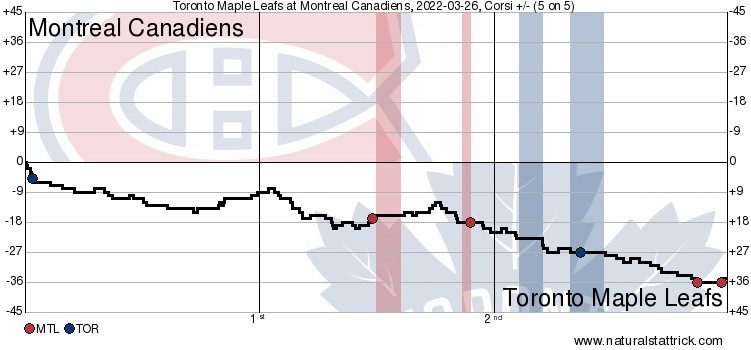
Heat Map: 5v5 Shot Attempts
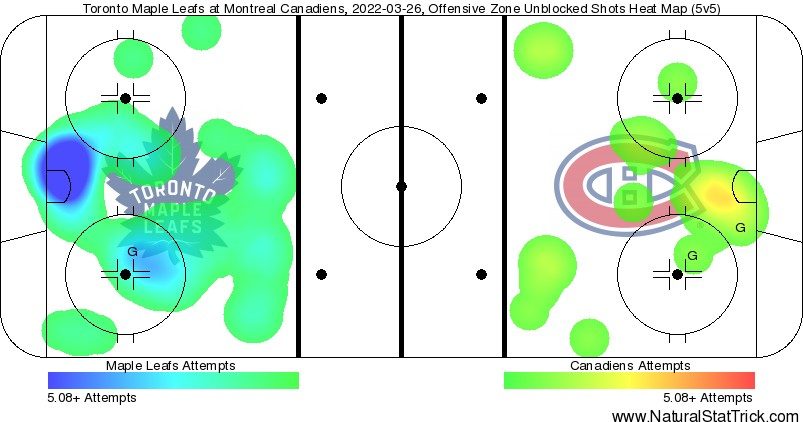












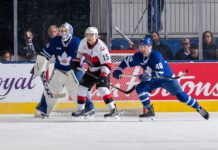





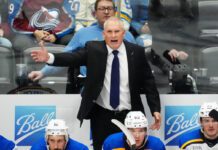


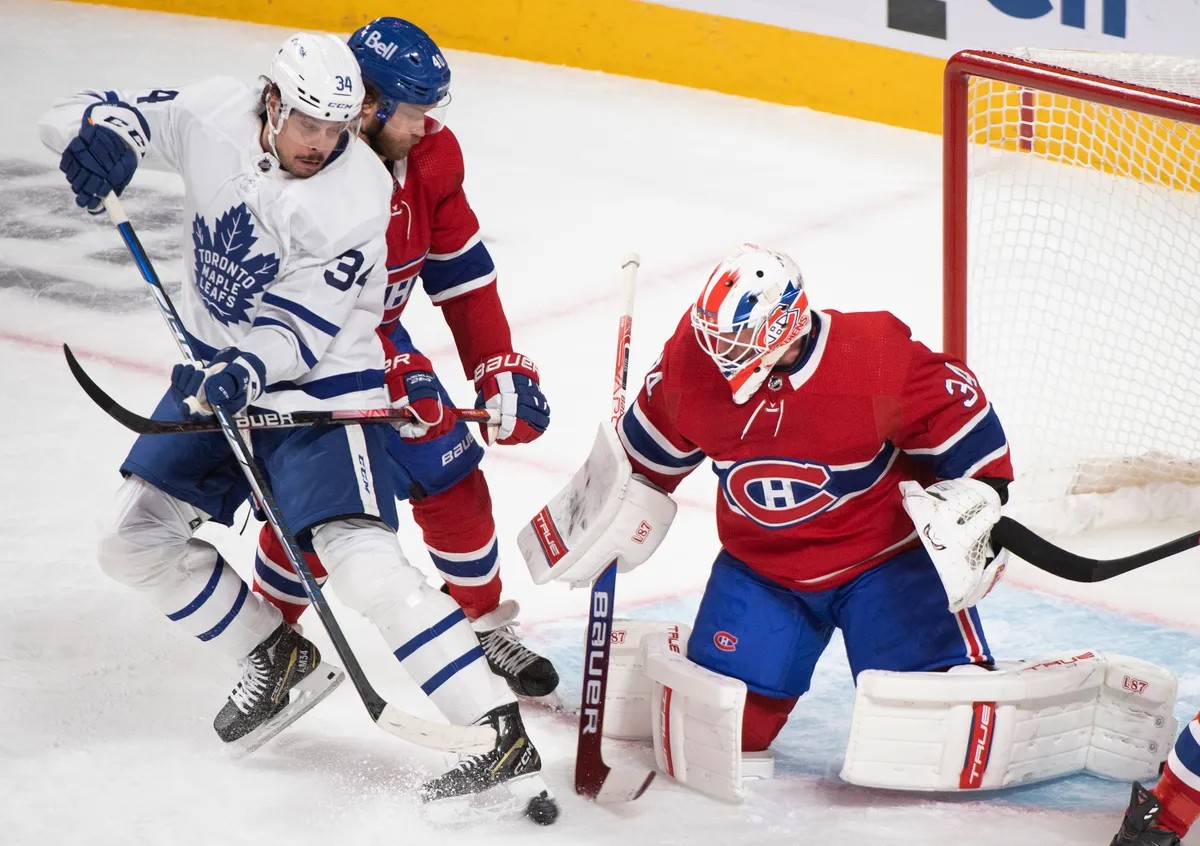








![New Leaf Anthony Stolarz on the opportunity in Toronto: “In Florida, I knew my role as a backup… Now, [Joseph Woll] and I are competing for starts… As a goalie, that’s all you can ask for” Anthony Stolarz, Stanley Cup win, now Maple Leaf](https://mapleleafshotstove.com/wp-content/uploads/2024/07/anthony-stolarz-sc-100x70.jpg)
